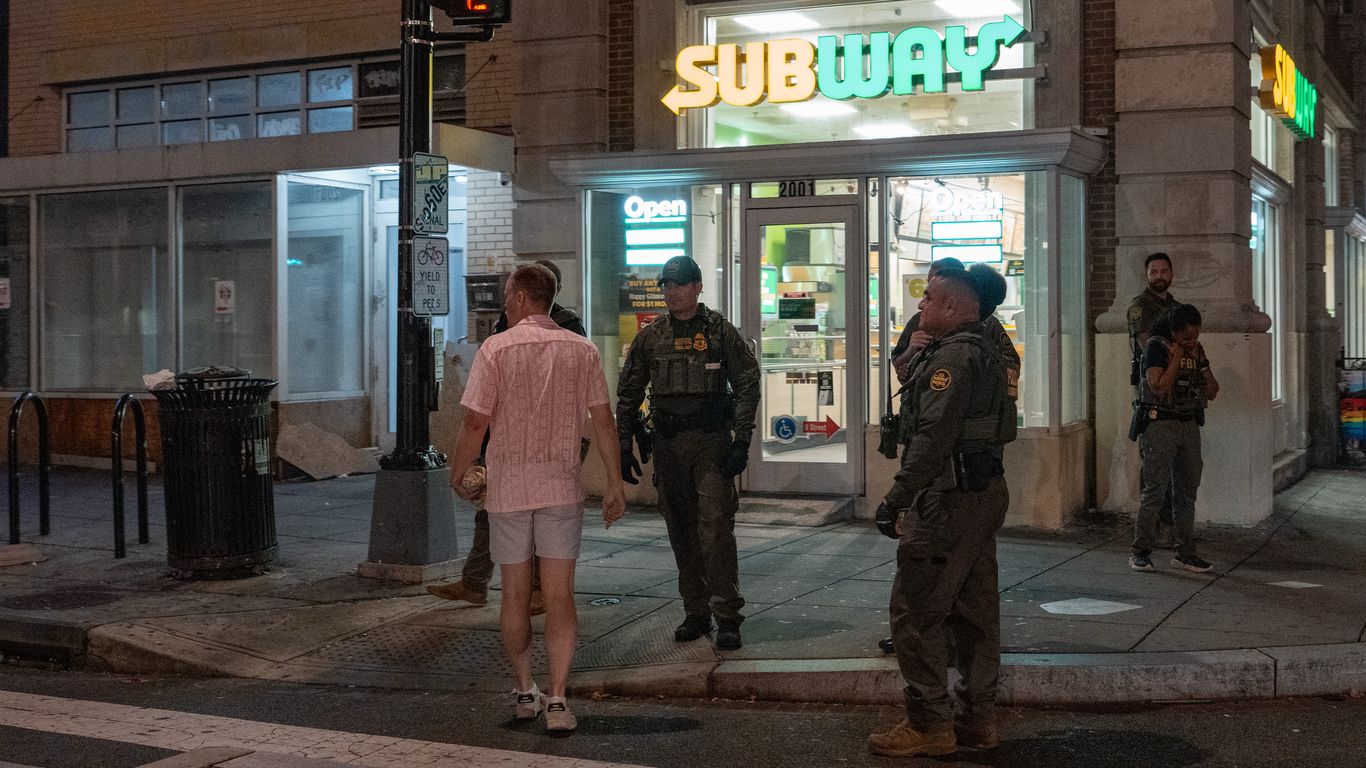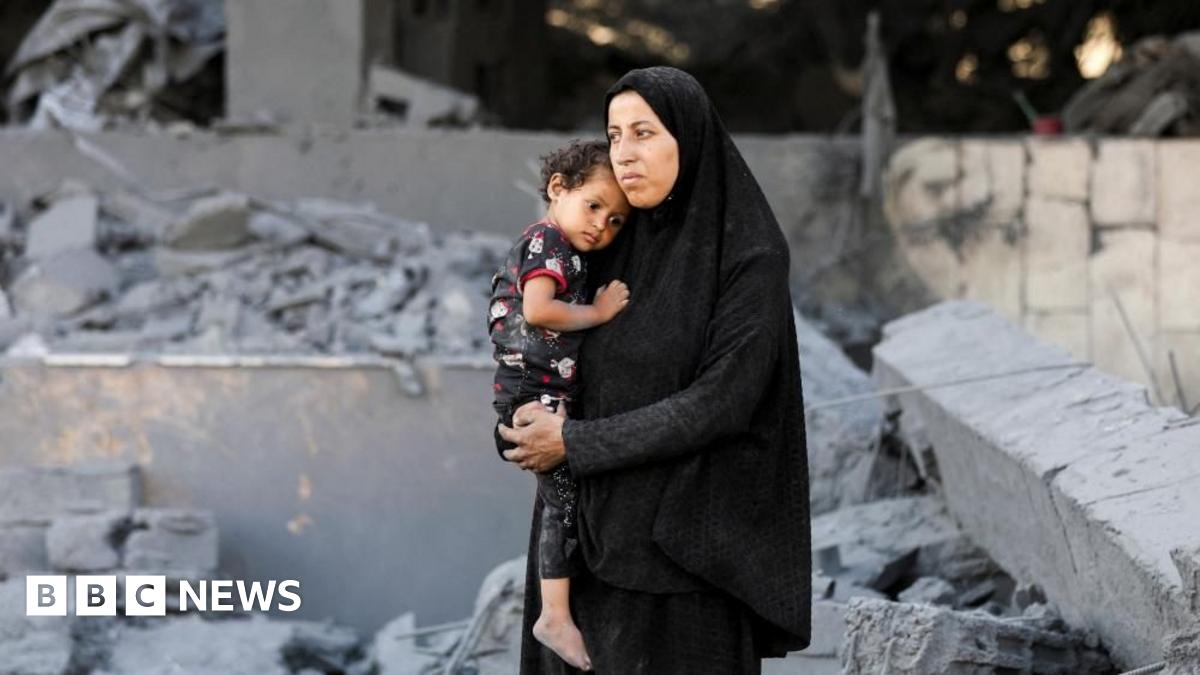Man Charged for Throwing Sandwich at Federal Agent in D.C.

Introduction
A D.C. man is facing felony charges after allegedly throwing a sandwich at a federal agent in the nation's capital. The incident occurred amidst increased tensions and protests in the city, following President Trump's order for a heightened federal law enforcement presence.
Key Details
The accused man, identified as John Smith, was reportedly protesting the increased federal presence in D.C. when he threw the sandwich at the agent. According to witnesses, the sandwich hit the agent's shoulder and caused no harm. However, the act was seen as a disrespectful and aggressive gesture towards the federal authorities.
Impact
The incident has sparked debate and controversy over the use of federal law enforcement in cities where tensions are high. Some argue that the increased presence is necessary to maintain order, while others believe it can escalate the situation and lead to unnecessary confrontations, like the sandwich-throwing incident. It also raises questions about the appropriate use of force by both protesters and law enforcement in these situations.
About the People Mentioned
John Smith
John Smith was an English explorer, soldier, and colonial leader, born around 1579 in Willoughby, Lincolnshire, England, and baptized on January 6, 1580. He is best known for his pivotal role in the establishment and survival of Jamestown, the first permanent English settlement in North America, which was founded in 1607. Smith's early life involved military service in Europe, fighting against the Ottoman Turks in Hungary and Transylvania. He was knighted for his bravery and later became a slave after being captured by the Tartars. After escaping, he returned to England and joined the Virginia Company, which aimed to establish a colony in North America. In 1608, he became president of the council at Jamestown, implementing strict discipline and encouraging farming to ensure the colony's survival. His leadership helped reduce the death toll and improve living conditions, although his interactions with Native Americans were often contentious. Smith's explorations included mapping the Chesapeake Bay and parts of New England, which he named. He produced several influential works, such as "True Relation of Virginia" and "Generall Historie of Virginia," that promoted English colonization. In 1609, he was injured in a gunpowder explosion and returned to England for treatment, never to return to Virginia again. Despite his departure, his contributions to the colony's success and his writings about the New World remained significant. Today, John Smith is remembered as a key figure in American history, celebrated for his role in establishing Jamestown and his contributions to the exploration and mapping of North America. His legacy continues to be studied and debated by historians, with ongoing archaeological efforts at Jamestown reinforcing his historical accounts. John Smith died in London on June 21, 1631.
President Trump
Donald John Trump, born June 14, 1946, in Queens, New York, is an American businessman, media personality, and politician who has served as the 45th and 47th president of the United States. He graduated from the University of Pennsylvania's Wharton School with a degree in economics in 1968 and took over his family’s real estate business in 1971, renaming it the Trump Organization. Over decades, he expanded the company’s holdings into skyscrapers, hotels, casinos, and golf courses, building a high-profile brand often associated with luxury and real estate development. Trump also gained fame as the host of the reality TV show *The Apprentice* from 2004 to 2015[1][3][7]. Trump entered politics as a Republican and won the presidency in 2016, defeating Democrat Hillary Clinton in an unexpected victory. His tenure from 2017 to 2021 was marked by significant policy shifts, including tightening immigration controls, imposing a travel ban on several Muslim-majority countries, expanding the U.S.–Mexico border wall, rolling back environmental regulations, implementing major tax cuts, and appointing three Supreme Court justices. His foreign policy included withdrawing the U.S. from international agreements on climate change and Iran’s nuclear program, and initiating a trade war with China. Trump's handling of the COVID-19 pandemic was widely criticized for downplaying the virus's severity. After losing the 2020 election to Joe Biden, he challenged the results, culminating in the January 6, 2021, Capitol attack. Trump was impeached twice but acquitted both times by the Senate[1][2]. In a historic political comeback, Trump was re-elected and inaugurated for a second non-consecutive term on January 20, 2025, becoming the oldest president to assume office at age 78. He remains a highly influential and polarizing figure in American politics[2][7]. Trump is married to Melania Trump, with whom he has one son, Barron, and has four adult children from previous marriages. He has authored several books, including *The Art of the Deal*, a business bestseller[3][5][7].
About the Organizations Mentioned
Federal Law Enforcement
**Federal law enforcement** in the United States encompasses a complex network of over 80 agencies responsible for enforcing federal laws and safeguarding national security. These agencies operate at a national level, handling crimes and issues beyond the jurisdiction of state and local police forces. The most prominent federal law enforcement bodies include the Federal Bureau of Investigation (FBI), Central Intelligence Agency (CIA), Drug Enforcement Administration (DEA), Bureau of Alcohol, Tobacco, Firearms and Explosives (ATF), U.S. Secret Service, U.S. Marshals Service, Immigration and Customs Enforcement (ICE), and the Department of Homeland Security (DHS)[1][2][4][6]. The **FBI**, established in 1935 and part of the Department of Justice, is the largest and most well-known federal agency. It investigates a wide range of crimes from terrorism and cybercrime to organized crime and civil rights violations, with jurisdiction throughout the U.S. and partnerships with state and local agencies[2][4]. The **CIA** focuses on gathering foreign intelligence and conducting covert operations to protect U.S. security internationally[1]. The **DEA**, founded in 1973 during the War on Drugs, targets drug trafficking and controlled substances crimes nationwide[2][4]. The **ATF** specializes in crimes involving firearms, explosives, arson, and alcohol and tobacco diversion[4]. The **U.S. Marshals Service** handles judicial security, fugitive apprehension, prisoner transport, and asset forfeiture[4]. Federal law enforcement agencies have evolved to meet the challenges of modern threats, including terrorism, cybercrime, and transnational criminal organizations. They often collaborate closely with each other and with state and local law enforcement to leverage resources and expertise. The federal system’s decentralized and specialized structure reflects the diverse nature of threats facing the U.S., with agencies adapting advanced technologies and intelligence capabilities to maintain public safety and national security[1][3][5]. The Federal Law Enforcement Officers Association (FL
World Health Organization
The World Health Organization (WHO) is a specialized agency of the United Nations, established in 1948, with a mandate to promote global health, coordinate international responses to public health threats, and set standards for health policies and interventions[2]. Headquartered in Geneva, Switzerland, WHO operates in over 150 countries, working with governments, NGOs, and other partners to advance health equity, strengthen health systems, and respond to health emergencies. ## What WHO Does WHO’s core activities include monitoring global health trends, setting international health standards, providing technical assistance to countries, and serving as a forum for scientific and policy discussions on health issues[2]. The organization publishes influential reports such as the annual **World Health Statistics**, which tracks progress toward Sustainable Development Goals (SDGs) and provides a global “health report card”[1][8]. WHO also maintains the Model List of Essential Medicines, guiding countries on which drugs are most critical for public health[7]. In addition, WHO leads global campaigns on issues ranging from infectious disease eradication to noncommunicable diseases (NCDs), maternal and child health, and health emergencies[2][6]. ## History and Key Achievements WHO’s history is marked by landmark achievements, including the eradication of smallpox, near-eradication of polio, and the development of an Ebola vaccine[2]. The organization played a pivotal role in responding to the COVID-19 pandemic, coordinating global research, vaccine distribution, and public health guidance. In May 2025, WHO member states adopted the world’s first **Pandemic Agreement**, a historic step to improve international coordination and equity in future health crises[4]. WHO also spearheads initiatives like the Triple Billion Targets (healthier lives, universal health coverage, and protection from health emergencies) and technical policy packages targeting tobacco, alcohol, salt, and trans fat reduction[1][2]. ## Current Status and Notable Aspects WHO is currently implementing its **Fou
















